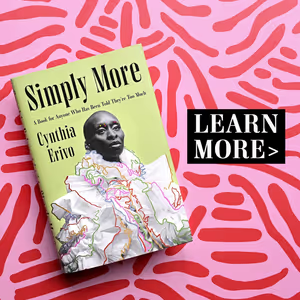Interview: WICKED Author Gregory Maguire on Movie Musical, Upcoming Prequel Novel & More
Maguire reflects on the story's enduring appeal, connecting with the cast of the film, what to expect from his new Wicked prequel book, and much more.
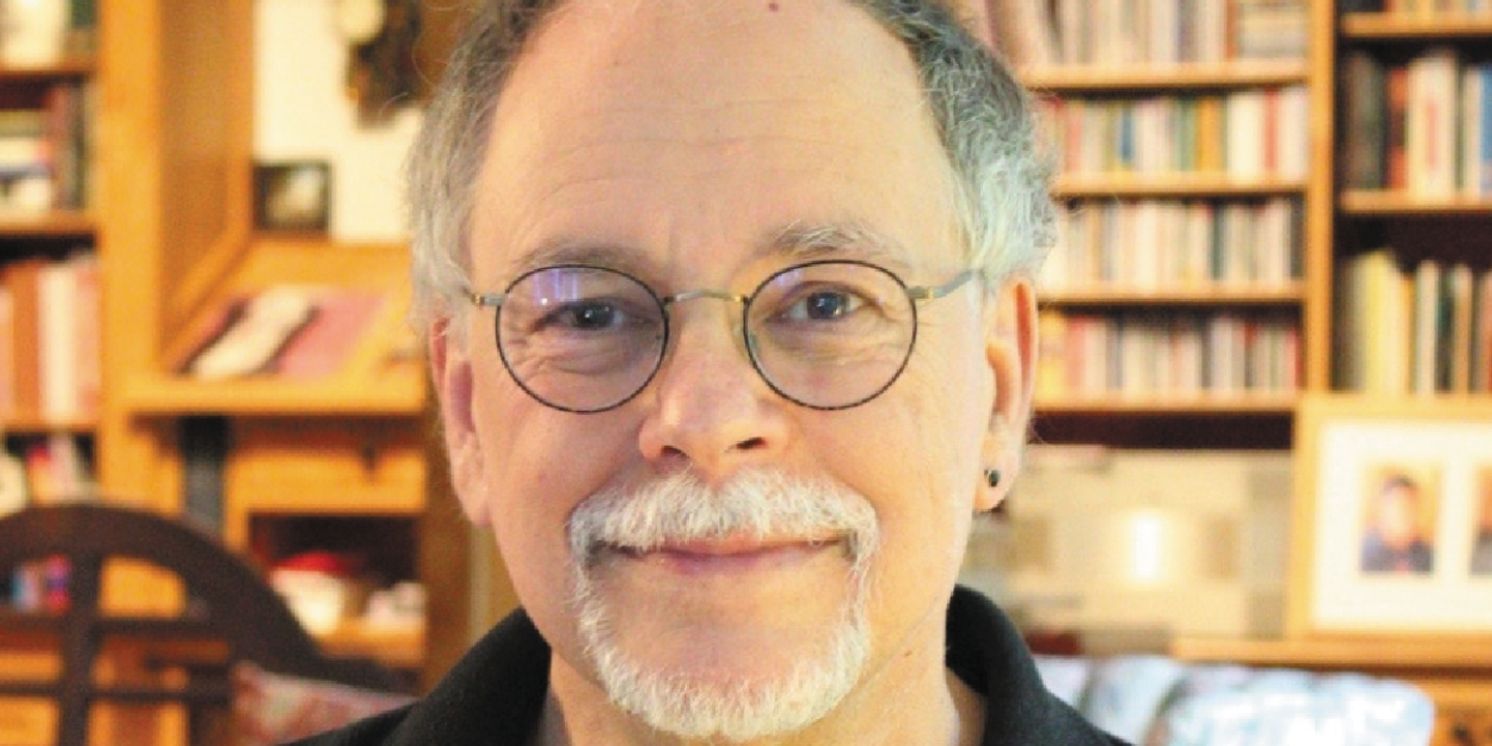
For nearly three decades, Gregory Maguire’s novel Wicked has captivated readers and audiences worldwide, transforming the tale of the Wicked Witch of the West into a nuanced exploration of power, morality, and friendship. As the first half of Jon M. Chu’s two-part film adaptation of the musical - starring Ariana Grande as Glinda and Cynthia Erivo as Elphaba- is released, BroadwayWorld had the opportunity to speak in depth with Maguire.
The Wicked author is soon returning to Oz with the March publication of Elphie: A Wicked Childhood—a prequel novel delving into Elphaba’s formative years. In BroadawayWorld's interview, Maguire reveals what inspired him to revisit Elphaba’s origins, his thoughts on the Wicked phenomenon as it continues to evolve, his visit to the film set, and much more. Read the full interview here!
I want to first start with your new book Elphie, A Wicked Childhood which is being published in March. What made you want to further explore Elphaba as a character, and how did you decide that her childhood should be the focus?
Here’s what happened. 30 years ago, my book Wicked landed on the desk of my editor Judith Regan, the person who decided to publish it. And after she and various editors at HarperCollins had read it, she came back to me and said, “Gregory, I love every word of it, of course, but it’s too long. We need to lose about 40 pages. We need to get to the second section where Elphaba and Glinda meet. We need to get there earlier. So you’re going to have to take stuff out of the beginning, you’re going to have to compress it somehow.”
And I could see the validity of what she was saying. There was so much in the beginning, even if it is somewhat impacted, there is a lot of information that undergirds everything that happens through the rest of the novel, especially about the culture of Oz, and the social conflicts, and the socioeconomic conflicts, and the gender conflicts, and class conflicts. So much of it is laid out in the first 40 pages, that I could not take out, without impacting in a bad way, everything that was to follow once Elphaba is grown up. But the thing that I did have to take out was two or three scenes in which Elphaba was a child, growing up, and slowly finding her powers before she gets to university.
So, I took those out, and I thought- not to be sacrilegious or anything- ‘Well, not much is known about the childhood of Jesus between the time he’s born in the stable and when he begins his adult campaign at the Wedding of Cana.’ There is one scene in which he’s walked up to temple and he’s discovered having a dialogue with the rabbis in the temple when he’s about 12, but that’s one scene, and that’s it. So, we don’t really know how heroes begin. Like King Arthur. Until T. H. White came along and showed us The Sword in the Stone, we don’t know where Arthur’s education came from, or how he became capable of being king of all England.
So, I had to take out those scenes 29 years ago. There weren’t really very many, not 40 pages worth, it was actually only about 4 pages worth, but I was never completely happy about it, I wanted Elphaba to be seen to be growing into her Elphie womanliness, if you will. And once the story of Wicked escaped from the chicken coop in my own backyard, it first became a bestselling book, then became a juggernaut Broadway international musical theatrical experience, and soon to be possibly an even bigger juggernaut experience of two films, I thought, ‘This intellectual property is going to outlive me whether I like it or not.’ I have let it go, I have let it grow up and grow its own wings, and chart its own journey across the Western skies.
But, it still comes out of my head, that’s who she is, that’s where she comes from. She may have morphed, she may have been reinterpreted by Winnie Holzman and Stephen Schwartz, and then interpreted by Idina Menzel, and Cynthia Erivo, and many other fine, fine actresses all of whom I adore, and whose interpretations I adore— but she’s still in my head first. And I finally decided, ‘Before I die, before I kick off and go over the rainbow, I want to put my impressions down.’ And if other people want to say, “Oh, it wasn’t like that at all.” Well, they have the privilege and right to do that as long as they get permission from my agents and lawyers, but I wanted to complete the story as it appeared to me in my own head.
And also, I’m older, I know more about childhood than I did 30 years ago, because I have raised three children now, and I can kind of see where the crux points of childhood really do shape character for good and for ill, and that’s what I wanted to play with.
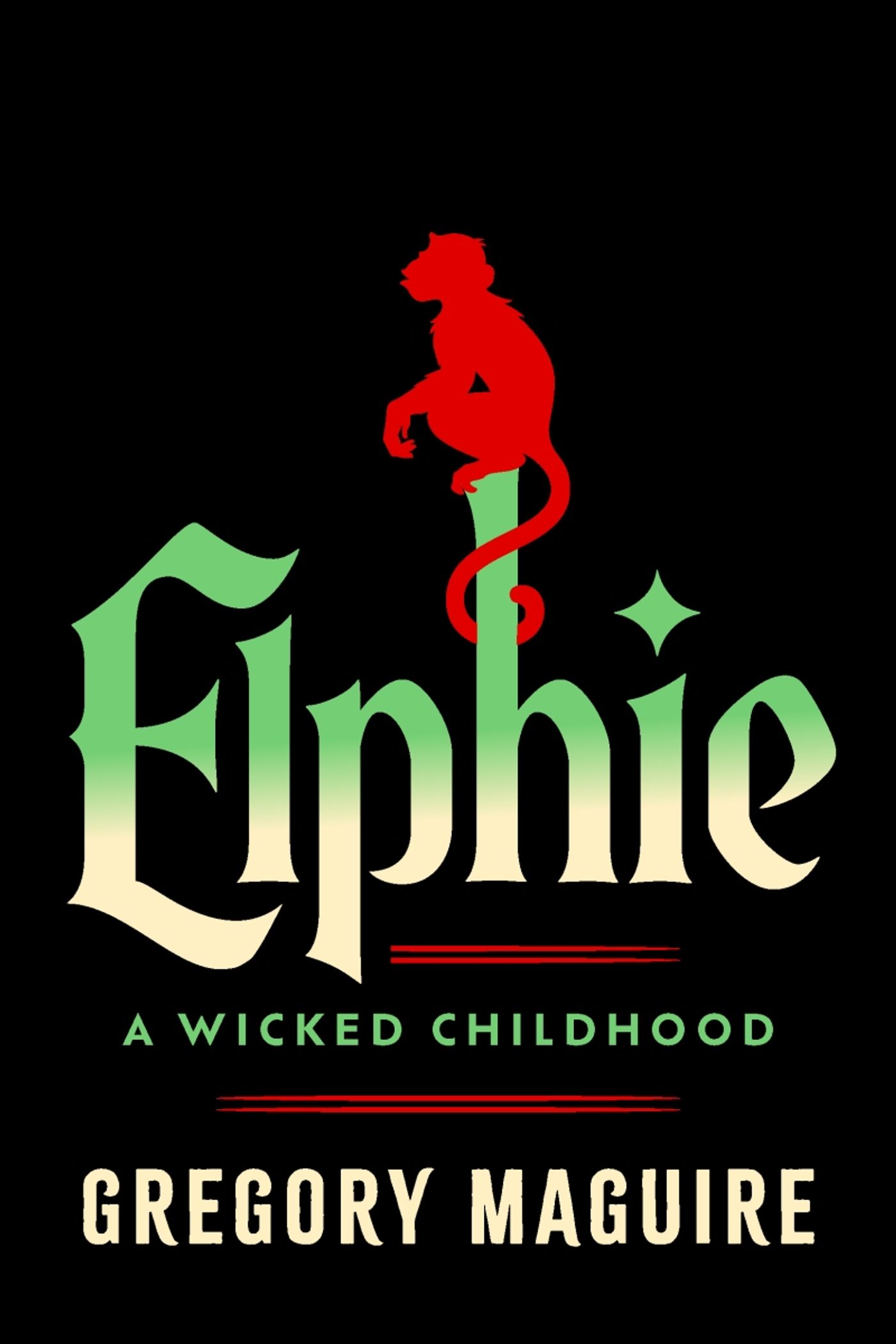
What will readers learn about Elphaba in this book that might surprise them?
Well, I don’t want to tell too much of it, because I do want it to be a surprise! But I will say, because it takes place from the time that she’s two until the time that she goes to university, you will inevitably see more of her mother, more of her father, more of Nessarose, and more of their baby brother, whose identity is known by anybody who has read the novel, but not particularly known by anybody who’s only seen the film, or only seen the musical. There are three children in the family, and always were, from the time Wicked was published.
You spoke about all of the different forms of Wicked. The first part of the film is out.
I did go to London about 18 months ago to watch filming for about three and a half days, and to meet the cast, and take a tour of the sets that had been built, and see some of the behind the scenes work that was being done to make it all come to life.
I saw how much loving attention the set designers, the art directors, and also the director Jon M. Chu has put into shaping the world of Oz so that it’s just as three dimensional and real as it could possibly seem on film. Now, there’s been a lot of commentary on social media that they’re going to regret how much of the film is done on CGI, and as I live and breathe- and I’m an honorable and honest person- most of the film sets were built, and are there, and I toured them. I was in the Wizard’s throne room, I was in Madame Morrible’s study, I was in the forest, I was in the underground Ozdust Ballroom, and I saw several other sets beside that weren’t being used in the time that I was there. This stuff is largely built.
Now, of course, the talking animals are going to be CGI, Peter Dinklage’s Dr. Dillamond is the miracle of what computer technology can do now. But I saw the apparatus for getting Elphaba up in the air to fly, and that’s not a cartoon drawing with computers, that’s the witch flying through the air on wires that had, what looked to me, twenty different attachments so that her body could twist, and shape, and move, and soar, and not just be dragged like the plug of a toaster across the floor in a single line. They make her move, and she gets up there and moves, and she flies. It was done against a green screen, but it’s not CGI acting or drawing in special effects, it’s people actually doing what is required of them. It’s just amazing. I’m gob smacked by the whole apparatus of it.
While you were there, did you get to speak with Jon M. Chu, Ariana or Cynthia?
Absolutely. I’m not going to pretend we became bosom buddies, the people that I talked with the most were Jonathan Bailey and briefly with Cynthia Erivo. But Cynthia and I have continued to be in touch by texting and stuff like that. They were all so sweet. Ari was great. I mean, it’s a bit affected of me to call her Ari when I only met her very briefly. But, she treated me like a beloved grandfather, and she didn’t actually raise her voice and shout into my eardrum, I’m not that old, but I felt like I was her grandfather, and I just felt so protective of her, and of Cynthia.
When I saw them shooting a scene in which they both are experiencing some distress, that’s what their characters are experiencing, and I’m watching the scene through the monitor at the side of the set, and they’re magnificent actresses, both of them. I just wanted to run across the set and shout, “Cut! Cut!” and grab them by their elbows and drag them through there so they could rest, and take them out of their miseries. They were so persuasive as performers that I got a little tutorial in what it is to be a film actress, or film actor, by watching them, and also watching Jonathan Bailey do the scenes that they were doing together.
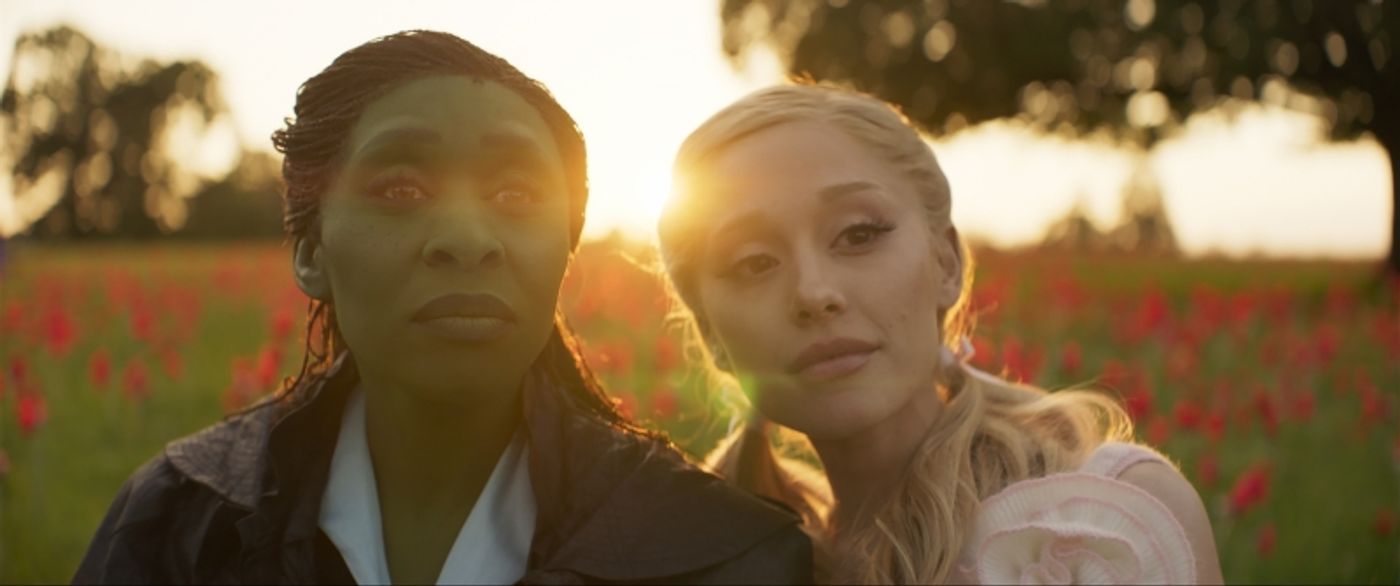
When you wrote Wicked, before it was adapted into a musical, you had said that you thought that it would make for a good movie or TV show. Now you’ve got the book, you’ve got the musical, and you’ve got the movie. How does it feel to you that there is another version of this story that came out of your mind?
I will be honest, it’s a bit daunting. I’m very glad that I live something of a modest life. When the brouhaha about Wicked the musical brought more attention to me as a writer than even the success of the novel had done seven years earlier, I had just adopted three children from overseas. And while I didn’t adopt them so they could serve as my mental health advocates, in fact, the needs to raise children, and to put their needs first above the needs of my own ego, or the pleasures of my own ego gratification, was a moral challenge I had taken on for myself, and I was determined that I would meet it. And I think that I have.
The benefit to me though, of putting them first, is I think it has saved me from getting bloated with admiration for my own achievements. I mean, I’m really glad this all happened, and it’s certainly made my life more comfortable, and in some ways less predictable because of all the attention, and the rewards that come with the attention paid to my work. And that means that I sell more books, and I’m more prosperous than I would have been otherwise— than I definitely would have been otherwise. But I didn’t move to Broadway, I didn’t move to LA, I didn’t try to change who I was, I just tried to use that part of my mind that loves to make up stories and examine character through the vise grip of plot. I just kept doing it.
I’ve written another 25 books after Wicked, and the fact that I had one giant, colossal, explosive success doesn’t change the impulse that I have in my heart every day when I wake up and think, ‘What am I going to do today? I want to make something. I want to make a new story. I want to examine the character of this kind of person. I want to try to write a cycle of poems. I want to try to write a play. I want to make something.’ And just like a kid who can’t leave the front porch because it’s raining out, ‘Well, what am I going to do with what I have? I’ve got three stones, and one of my sister’s broken dolls, and a bicycle without a seat. What am I going to do with it?’ And that makes something happen.
Wicked continues to resonate culturally, politically, socially. When we spoke a few years ago, we spoke about its relevance as we were going through this massive shift in our country in 2020. How do you think that Wicked resonates with everything we’ve got going on in our country today in 2024?
It's almost too intense to bear, the way Wicked seems every year to be becoming that little bit more pertinent. When I wrote the book in 1994, published in ’95, I thought it was kind of retro, and I thought it might be laughed out of the editorial slush fund for being too old fashioned, and for taking too 19th century a look about power and individuality, about communality and about individuality, but nope. I hitched my ideas to a bit of popular culture and it took. So, there we were. Seven years later when the play opened, again, after 9/11 I thought, 'Oh, who’s going to want to talk about being cautious about not demonizing our enemies when we’ve just been attacked, and the Twin Towers have fallen, and we’re at war with parts of the Middle East?' Rather than have that destroy the play, Wicked, it just began to make it more pertinent.
Now look where we are, 21 years later. I would not say by most standards of metric that our culture has become more accommodating, more just, and more kind than it had been 21 years ago. The tropes of the story continue to seem, not dulled, but ever sharper as the years go on. So, that keeps the story pertinent. I’m not happy about that, I would like it to become old fashioned in a way. That would mean we were getting somewhere. But, there is this mild bit of rare cynicism on my part, I fear that we’re not getting very far very fast, and that makes Wicked continue to be pertinent to pay attention to.
Elphaba and Glinda, they’ve existed for a long time, but not in the way that you’ve done it. And now, ever since your book, you’ve gotten to watch actors take on these roles and expand upon them. What is it like for you knowing that these characters have touched so many people? That it keeps growing? That people keep interpreting your words in their own way that touches them?
Well, that’s a really good question, and in a way it’s a question that’s too vast for me to answer because millions of people now have seen the play around the world, and millions of people have bought the book. I don’t know whether they’ve all read it, but they’ve bought it! [laughs].
Most of what happens in the theatre happens when I’m not there. All of what happens when people read the book happens privately between the reader and the pages of the book. My work was done when I submitted my book and it got printed. However, I can say, that I repeatedly get anecdotal stories from people, either in line when I’m signing books at a book event, or in the theatre if I happen to be there, or letters in the mail, or social media commentary, about individuals with specific moments in their lives when the book or the story, and the character of Elphaba particularly, but to some extent the friendship as well, have seen them through a difficult time. And I mean, Hurricane Katrina, one woman wrote to me and said she could only take one thing from the house and she took her copy of Wicked, and it fell in the water, and it floated up like a ham sandwich that had been left on a park bench in Central Park, and she still couldn’t get rid of it because it was her only talisman, and her token to normalcy when almost everything else that she had owned had been destroyed during the hurricane.
I got a letter from a woman once who said, “I could never concentrate on story, I had a brain injury when I was a child, and story was just too complex for me. I couldn’t read, I couldn’t understand it. And then I had to be in the hospital to have a spinal fusion, and it went wrong, and I had to lie down in a bed for eight months. And my father read me Wicked from front to end, and I sat there because I couldn’t move. I sat there for eight months, and it’s the first novel that I’ve ever read, that had been read to me. And what it meant to me to hear her story and her struggle as I was having my struggle.”
I have, I wouldn’t say countless, but dozens and dozens, if not hundreds and hundreds of anecdotes like that by people. Many of them marginalized. Immigrants, and gay people, and people who are physically compromised, and people who are social outcasts for one reason or another, who tell me that somehow they saw themselves in Elphaba, and how that gave them courage, and how that made them feel seen, and acceptable in this harsh world in which we live.
And that’s the thing I can answer to when you say, “How does it make you feel?” In every one of those individual instances, I feel individually grateful, and as they say, humbled that somehow something that was in my head and heart, about how to be good against all odds, has spoken to other people who have to try the same endeavor.
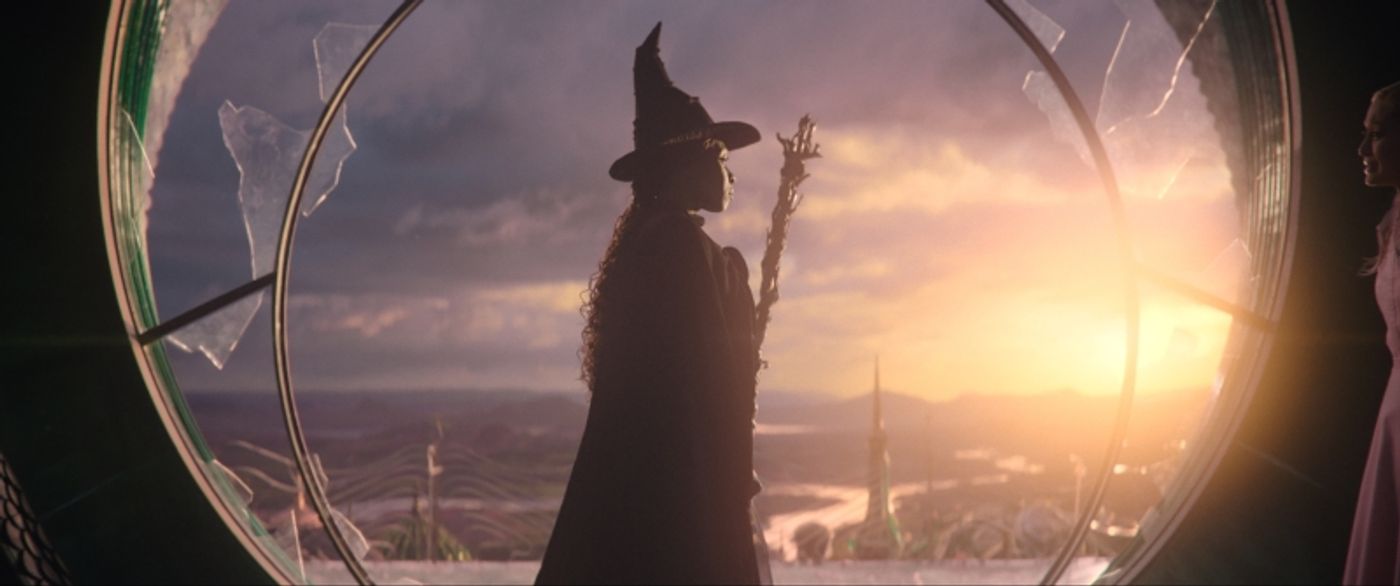
Do you have any final thoughts you’d like to share?
Where we end up, at the end of this conversation, is with a great sense just as at the beginning of Wicked the musical, what we arrive at when we get to the theatre, and the house lights go dark, and the curtain opens, the monkeys are raising the map of Oz, and the celebration of the death of the witch is about to begin at the top of the first act of Wicked. That’s the moment that I feel that I’m in right now, before the lights go dark in cinemas all over the world, and the machines start whirring, and the movie starts playing, and we are thrust into the technicolor world of Oz, which is only a mirror reflection of our own world once again. And I hope we watch it with our jaws dropped, the same way that Judy Garland stepped out of her black and white Kansas house into the technicolor world of Munchkinland. I think that’s what we will do when the movie opens.
Photo credit: Universal Pictures


